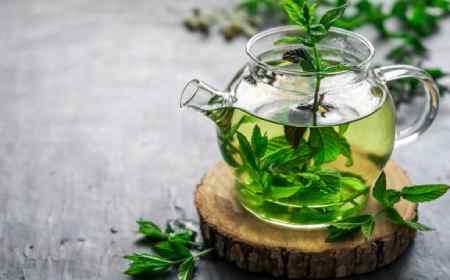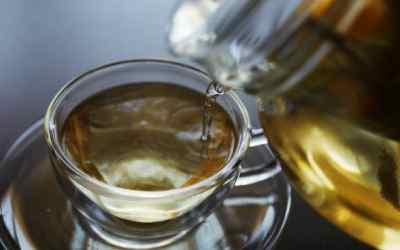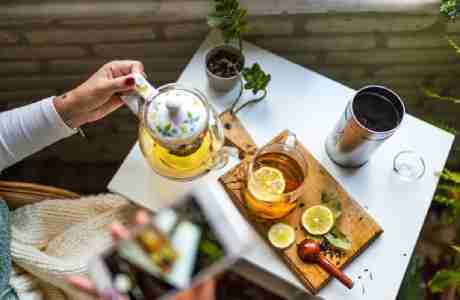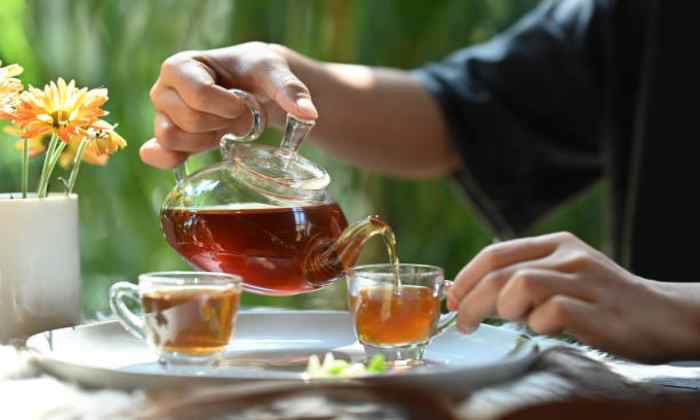Whether it’s the soothing calm of camomile or the refreshing zest of peppermint, these brews can help fight against common colds and indigestion. Plus, they come loaded with antioxidants, polyphenols and endless vitamins and minerals.
The five true tea varieties (green, white, black, oolong and pu-erh) are brewed from leaves of the Camellia sinensis plant. Herbal teas are also caffeine free and made with a mix of herbs, spices and fruits.
Soothing Chamomile Tea

Chamomile is a type of flower that’s often dried and used for herbal tea. It’s related to ragweed and chrysanthemums, so those with allergies to those plants may be sensitive to this one as well.
Chamomile contains anti-inflammatory chemical compounds and antioxidants. While some inflammation is necessary to help the body heal, too much can lead to a wide variety of health issues like gastrointestinal distress, hemorrhoids, arthritis, autoimmune disorders, and depression.
Regular chamomile tea consumption may also help to prevent heart disease. That’s because this herbal beverage is packed with flavonoids, which are known to improve cholesterol levels and triglycerides while helping the body relax and sleep better, look at this website.
Refreshing Hibiscus Tea

This tea is sweet & tangy (like cranberry juice) and a great alternative to caffeinated drinks. It is loaded with antioxidants & provides you with essential dietary fiber to help keep you healthy. It also helps reduce high blood pressure & promotes weight loss.
Hibiscus sabdariffa is packed with antibiotic properties – this helps your body fight off bacteria that can cause a variety of health problems, from the common cold to bronchitis & even urinary tract infections. Hibiscus has also been found to fend off many strains of E-coli.
It is also full of potassium which can help with heart health & lower blood pressure. However, if you are taking medication for high blood pressure you should not drink this herbal tea as it can drop your blood pressure too low. Also, pregnant women should not drink hibiscus tea as it can lower your estrogen levels & prompt menstruation.
Boosting Your Immune System
There are several herbal teas that can give your immune system a boost. These include peppermint tea that can treat the common cold and seasonal allergies, hibiscus tea that is a natural diuretic and reduces high blood pressure, ginger tea which fights nausea, vomiting, and spasms, and turmeric tea that prevents inflammation, bloating, and boosts cognition. Dandelion tea has detoxifying properties, while ginseng boosts white blood cell production and contains interferon that helps fight viruses.
Drinking herbal tea daily can boost your immunity and help you fight against infections and diseases such as COVID-19. This is because they contain a lot of vitamins and antioxidants that protect against oxidative stress, lower high blood pressure, prevent indigestion, promote weight loss, improve skin health, boost your cognition, alleviate arthritis symptoms, relieve pain, increase energy levels, enhance digestion, and prevent heartburn. Some herbs in these teas can cause tremors, insomnia, dizziness, nausea, or gastrointestinal irritation in sensitive individuals so make sure to research the ingredients before sipping on one.
Relieving Stress

A cup of herbal tea isn’t just good for your taste buds, it can also soothe your mind and body. Teas containing lavender, chamomile or valerian root are among the best herbs to drink to help relieve stress and anxiety. Some herbal teas also promote better sleep, which can ease stress and anxiety symptoms as well.
Lemon balm tea, in particular, has been shown to decrease cortisol levels, which is the hormone associated with stress. Other calming ingredients found in herbal teas include peppermint and fennel.
Conclusion:
Even the act of preparing and sipping a cup of tea can be therapeutic. Take a moment to slow down and enjoy your tea while sitting down, breathing in the aromas and paying attention to your senses. While tea won’t replace anxiety treatment or other mental health care, it can be a great complement to your current regimen. If you are interested in trying herbal tea to relax, ask your healthcare provider about the safe amount and type of tea to consume.


